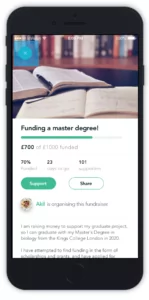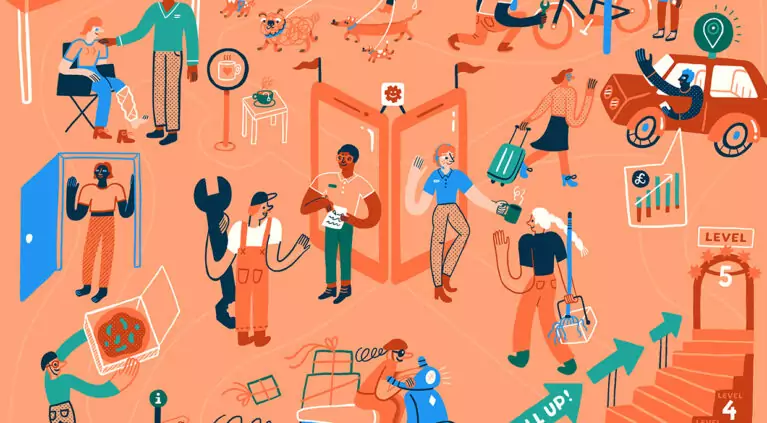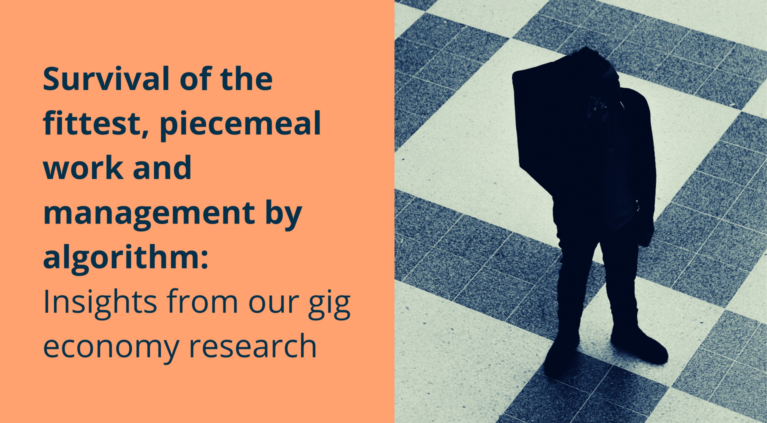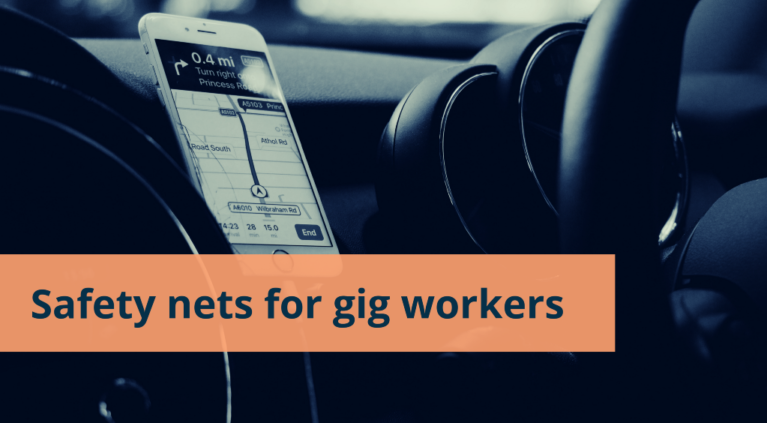Re-designing digital gig work
The working lives of digital gig workers are in the hands of an app. For some gig workers this offers welcome flexibility and autonomy over their work, but others struggle with severe financial insecurity, have no space for career development and feel disrespected by their algorithmic bosses.
Given the profound impact the structure of these platforms has on gig workers’ lives it is important to show how they could be redesigned to enable workers to live with financial security, dignity and dreams.
Following research with gig workers from across the UK, and with their input, we considered policy changes which would help improve the lives of those most disadvantaged by gig work. Alongside these, with the help of design agency Comuzi, we developed the speculative gig work platform AvocaGo. This illustrates practical platform modifications which would bring our vision for better work to life.
Watch the walkthrough video of AvocaGo here:
Doteveryone’s approach to design thinking – ‘Designing for the furthest first’
At Doteveryone, we work to make tech better for everyone. This means working to change how tech is made and used so that it supports a fair, inclusive and sustainable democratic society.
We don’t actually make finished tech products ourselves – instead we help the people who do, embed responsibility. This often involves creating prototypes to show how tech could be better.
We use design thinking in all of our projects. Design thinking is human-centred, multi-disciplinary and involves research, and rapid ideation. Very often, the problems that arise during our projects are complex, hard to define and can be somewhat unknown. We use design thinking to reframe these problems in a human-centric way. This helps to simplify them somewhat, allowing us to develop ideas and come up with practical solutions.
IDEO, the organisation that brought design thinking to the mainstream, splits the process roughly into three sections: inspiration, ideation and implementation.
At Doteveryone we don’t often travel far past the ideation phase (identifying opportunities for design, and prototyping possible solutions). We use prototyping to understand people’s needs, provoke conversations and show that change is possible, but as a small organisation we don’t have the capacity to scale them into a full-blown business. Our role is in converting the insights we get from our research participants into ideas that organisations better suited to putting them into practice can learn from and implement. These may be civil society organisations, governments, companies or individuals.
What always remains central to the way we do this is the ethos of ‘designing for the furthest first’. This means meeting the most excluded and marginalised people and putting them at the heart of our design. By designing for those who live with constant difficulty, you also design for those experiencing temporary or situational difficulty – leading to solutions that work for more people more of the time.
This draws parallels with Microsoft’s guidelines for inclusive design.
Design thinking in practise – ‘Guerrilla Research’
Alongside more conventional research methods like user interviews and workshops, we carried out a fair amount of Guerrilla Research in the Better Work project. This involves getting out into the world and talking to people in the context of their day-to-day lives, which is an effective method for addressing questions as soon as they arise.
As well as chatting to pretty much any gig worker I came across in my daily life (apologies to the drivers who picked me up and my friends working on digital platforms), we also commissioned a variety of jobs through various gig platforms. After securing informed consent for taking part, we talked in depth about life in the gig economy, whilst they were on the job. And of course, we fairly compensated everyone who took part for their time. Here are some reflections from a trip with Senior Research, Jacob, to Stoke-on-Trent to meet some of the Uber drivers working there.
Meeting workers in ‘their space’ led to more relaxed and open conversations, with less of the ‘observer effect’ often experienced in interviews. As we were initially a customer to them, it removed the traditional interviewer-interviewee dynamic; drivers are used to chatting with their customers so, when talking to us in the context of a job, it felt like a more genuine, open and honest conversation.
This approach also helped us tap into workers’ Creative Confidence – a concept coined by David Kelley, co-founder of IDEO. It is the belief ‘that everyone is creative, and that creativity isn’t the ability to draw or compose or sculpt, but a way of understanding the world’.
In practise, this involves providing workers with a non-judgmental space where they’re able to share their ideas in the knowledge that what they say will be respected and taken seriously.
Through sharing our ideas in engaging and accessible ways, workers are able to provide actionable feedback which would later become instrumental in the development of the project.
For example – one of the research participants suggested a crowdfunding option tailored to workers’ own ambitions as an alternative to generic in-app tipping, an idea we gratefully incorporated into the AvocaGo prototype.

Guerilla research helping us reach the ‘furthest first’
Another advantage of the guerilla approach is that it helped us ensure we were designing for the ‘furthest first’. It enabled us to reach those with most to gain from changes in how the gig economy currently operates. We struggled to find such people through a traditional recruitment agency – unsurprisingly these most vulnerable workers don’t tend to be those who have time to seek out these opportunities.
Lastly, the frank conversations gave us a plethora of powerful quotes. They helped to ground our conversations with key stakeholders, including policymakers, in the lived experiences of the workers. They also captured the media’s attention, from The Guardian, Telegraph and even as far as Malaysia.
‘The gig economy feels like quick-sand and you need a lot of support to get out of it…’ Cleaner, London
‘Since working [gigs] I have put on a stone, I’m not using any of my muscles.’ Driver, Stoke-on-trent
‘I do not have the time to improve my skills, because my number one priority is to be earning enough to survive’ Micro tasker, Birmingham
Now that the voices of the gig workers we spoke with, and our recommendations, are out there in the world, we’re really encouraged that there are organisations who are already keen to take some of our proposals forward. We hope to see them start to become a reality soon and therefore improve support for all gig workers to help them live with financial security, dignity and dreams.
With this in mind, if you feel you are in a position to potentially implement some of the ideas raised in our report please get in touch.





